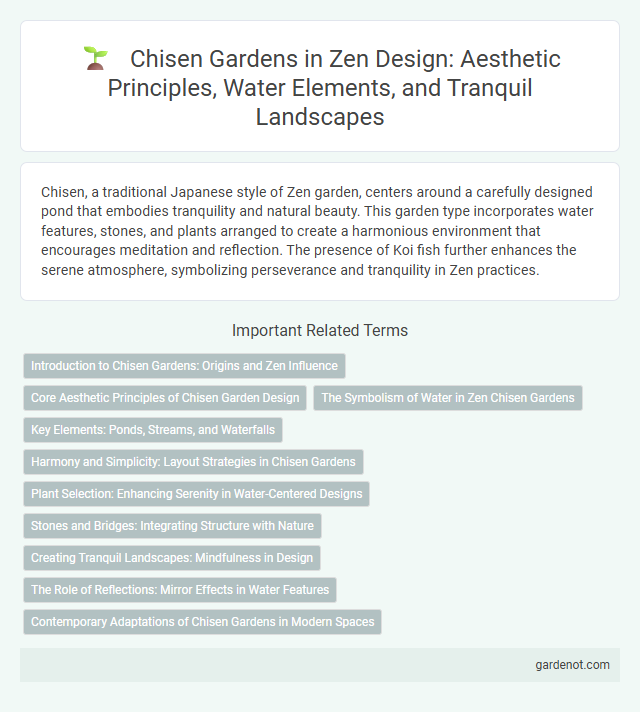Chisen, a traditional Japanese style of Zen garden, centers around a carefully designed pond that embodies tranquility and natural beauty. This garden type incorporates water features, stones, and plants arranged to create a harmonious environment that encourages meditation and reflection. The presence of Koi fish further enhances the serene atmosphere, symbolizing perseverance and tranquility in Zen practices.
Introduction to Chisen Gardens: Origins and Zen Influence
Chisen gardens originated in ancient Japan, blending traditional landscape design with Zen Buddhist principles to create tranquil environments centered around natural water features. These gardens emphasize harmony between water, rocks, and plant life, reflecting the impermanence and mindfulness integral to Zen philosophy. Notable for their serene ponds and carefully arranged stones, Chisen gardens foster meditation and spiritual reflection.
Core Aesthetic Principles of Chisen Garden Design
Chisen garden design emphasizes harmony between water and landscape, creating tranquil spaces through carefully arranged ponds, islands, and bridges that evoke natural scenery. Key aesthetic principles include asymmetry, balance, and the strategic use of rocks and plants to symbolize natural elements and seasons. The garden's flowing water structures and open views foster reflection and spiritual calm, embodying the essence of traditional Japanese Zen philosophy.
The Symbolism of Water in Zen Chisen Gardens
Water in Zen Chisen gardens symbolizes purity, renewal, and the continuous flow of life, reflecting core principles of Zen Buddhism. The gentle ripples and stillness in the water embody the balance between movement and tranquility, encouraging mindfulness and inner peace. Features like ponds, streams, and waterfalls recreate natural landscapes, enhancing the garden's meditative atmosphere and spiritual harmony.
Key Elements: Ponds, Streams, and Waterfalls
Chisen gardens emphasize the harmonious integration of ponds, streams, and waterfalls, creating a naturalistic landscape that reflects the changing seasons. These water features symbolize the flow of life and promote tranquility through their gentle sounds and reflective surfaces. The precise arrangement of stones and plants around these elements enhances the aesthetic balance and spiritual ambiance characteristic of traditional Japanese Zen gardens.
Harmony and Simplicity: Layout Strategies in Chisen Gardens
Chisen gardens emphasize harmony and simplicity through carefully designed water features and natural elements arranged to create a balanced, serene environment. The layout strategically uses ponds, streams, and stepping stones to foster a seamless integration between nature and space, promoting tranquility. Minimalist plantings and open spaces ensure focus remains on natural flow and meditative experience, embodying traditional Japanese garden aesthetics.
Plant Selection: Enhancing Serenity in Water-Centered Designs
Chisen gardens emphasize the careful selection of plants such as Japanese maple, azalea, and irises to enhance the tranquil atmosphere surrounding ponds and streams. These species are chosen for their seasonal blooms, subtle colors, and reflective qualities that complement the water's surface, promoting a peaceful visual harmony. Utilizing native aquatic plants like lotus and water lilies further elevates the serenity by reinforcing the natural ecosystem and soothing spatial experience.
Stones and Bridges: Integrating Structure with Nature
Chisen, a traditional Japanese garden style featuring ponds and streams, harmonizes stones and bridges to enhance natural flow and balance. Carefully placed stones function not only as aesthetic focal points but also as symbolic elements representing mountains or islands, creating a tranquil atmosphere. Bridges in Chisen gardens serve both practical and visual purposes, connecting pathways while seamlessly integrating with the surrounding water and greenery to evoke a sense of unity between structure and nature.
Creating Tranquil Landscapes: Mindfulness in Design
Chisen, a traditional Japanese water garden, embodies mindfulness in design by harmonizing natural elements like water, stones, and plants to create tranquil landscapes that promote reflection and calm. The careful arrangement of ponds, waterfalls, and stepping stones encourages a sensory experience, fostering deep contemplation and connection with nature. Emphasizing balance and simplicity, Chisen gardens serve as peaceful retreats that enhance mental clarity through immersive, serene environments.
The Role of Reflections: Mirror Effects in Water Features
Chisen-style Zen gardens emphasize water features that create mirror effects to symbolize clarity and tranquility. Reflective surfaces in ponds and pools capture the surrounding natural elements, enhancing the visual harmony and spiritual depth of the garden. These reflections play a crucial role in connecting the observer to the essence of mindfulness and inner peace.
Contemporary Adaptations of Chisen Gardens in Modern Spaces
Contemporary adaptations of Chisen gardens blend traditional Japanese pond design with modern aesthetics, incorporating minimalist elements and sustainable materials to create tranquil urban oases. These modern Chisen gardens utilize advanced water filtration systems and native plant species to enhance ecological balance while preserving the serene ambiance characteristic of classical designs. Innovative lighting and sculptural features are integrated to harmonize natural and built environments, making Chisen gardens a versatile element in contemporary architectural projects.
Chisen Infographic

 gardenot.com
gardenot.com